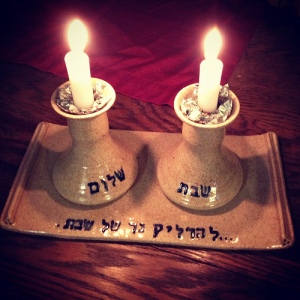Shabbat is the holiest day of the year -- and it comes every single week!
 Shabbat begins at sundown on Friday night, and ends at sundown on Saturday night. Home observance usually includes the lighting of Shabbat candles, the blessing of grape juice or wine, and the blessing of challah. For those who have children at home, there is also a tradition of blessing one's children.
Shabbat begins at sundown on Friday night, and ends at sundown on Saturday night. Home observance usually includes the lighting of Shabbat candles, the blessing of grape juice or wine, and the blessing of challah. For those who have children at home, there is also a tradition of blessing one's children.
Some of us maintain the traditional practice of lighting candles at sundown, which shifts over the course of the year (sundown in January is quite early in the afternoon; sundown in June is quite late in the evening.) Others choose a set time to light each week (for instance, at a child's supper time, regardless of whether that is before or after sundown.) These are both legitimate Jewish paths.
Here is a link to Shabbat Blessings | Reform Judaism -- blessings for candles, juice, bread, and children, among others.
Nava Tehila, the Jewish Renewal community of Jerusalem - all of their music is available for free streaming online, and much of it features beautiful settings of Shabbat liturgy set to contemporary Israeli melodies
Shir Yaakov, contemporary American singer / songwriter (and rabbi), has recorded some beautiful melodies for Shabbat liturgy, also available for free streaming online
The Sabbath by Rabbi Abraham Joshua Heschel (this is in the synagogue library and is available to borrow!)
"Elegant, passionate, and filled with the love of God's creation, Abraham Hoshua Heschel's The Sabbath has been hailed as a classic of Jewish spirituality ever since its original publication in 1951 -- and has been read by thousands of people of many faiths seeking meaning in modern life. In this brief yet profound meditation on the meaning of the Seventh Day, Heschel introduced the enormously influential idea of an 'architecture of holiness' that appears not in space but in time. Judaism, he argues, is the religion of time: it finds meaning not in space and the material things that fill it but in time and the eternity that imbues it, so that 'the Sabbaths are our great cathedrals.'"
Reclaiming Judaism as a Spiritual Practice: Holy Days and Shabbat by Rabbi Goldie Milgram (this is in the synagogue library and is available to borrow!)
"In this fresh and delightful guide, Rabbi Goldie Milgram, well-known pioneer in Jewish education and innovation, guides you on a quest to rediscover spiritual meaning for living. Focusing on Jewish holy days and Shabbat, Rabbi Goldie solidly grounds her teachings in a context of religious pluralism with careful attention to both tradition and cutting-edge developments across the full spectrum of Jewish life. From engaging in meditation walks to prepare you to do teshuvah, to identifying the minyan of your life, to creating a spiritual menu for your Passover seder, the practices in this inspiring guide resonate with your concerns today. Whether new to Judaism, deeply engaged, or returning with curiosity and hope after a long absence, Rabbi Goldie provides the spiritual tools you need to dig beneath the layers of tradition to reconnect with a healthy spiritual life infused with meaning, integrity, and joy."
We spend most of our days living in “commodity time.” Just as our movements take us down a particular path over the course of our day, so does our daily life occupy a certain segment along the axis of time. In commodity time the points along that segment — when we get up, eat work, exercise, spend time with our loved ones, go to sleep – are dictated not so much by our physical needs, far less our emotional or spiritual ones, as by the demands of running an efficient marketplace… Sabbaths are like periods inserted into an otherwise endless run-on sentence. They help us know when it is time to stop and take a breath. They remind us to take a weekly break from living in commodity time to re-anchor ourselves in what we might call “organic time,” a way of living more in tune with our own deepest needs — as well as those of our family and the entire community and society of which we are a part.– Jewish With Feeling: A Guide to Meaningful Jewish Practice, by Rabbi Zalman Shachter-Shalomi with Joel Segel